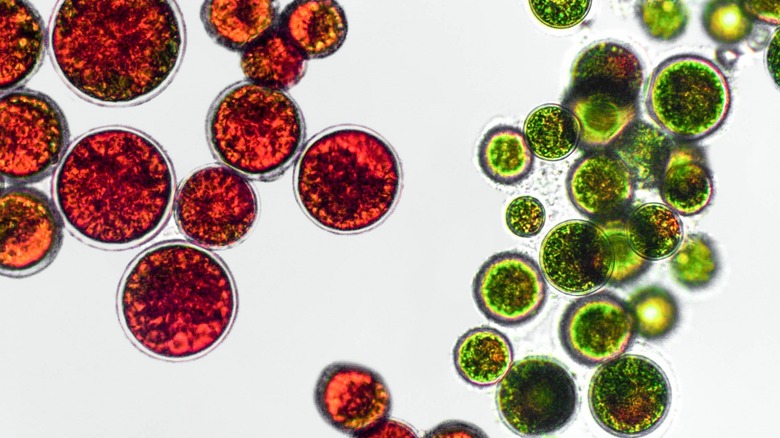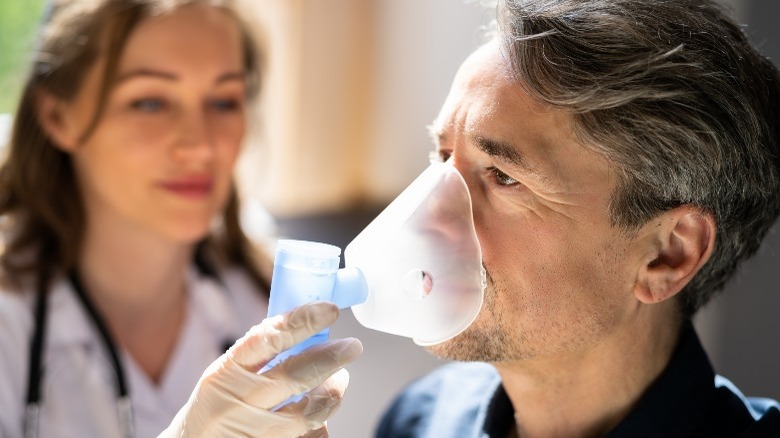What Happens To Your Body If Your Oxygen Levels Are Too Low?
Oxygen is an essential ingredient for most life on earth. For humans, oxygen is a basic survival need, just like food and water, and had been a topic of discussion in relation to the missing submersible craft (via CNN).
According to MedicalNewsToday, you might survive for a month or two without food; and you may hold out for a few days without water. However, oxygen is perhaps our most urgent survival need — we cannot live long without it. Long-term brain damage onsets when you are starved of oxygen for a meager four minutes. If you go another four-to-six minutes without oxygen, it could be fatal (via MedlinePlus).
When your blood oxygen levels are low, you may experience hypoxemia (not to be confused with hypoxia: a lack of oxygen in your tissues). Hypoxemia may cause hypoxia, but the latter can develop independently (via the Cleveland Clinic). Hypoxemia can be caused by a wide range of factors including high altitude, chronic obstructive pulmonary disease (COPD), asthma, and sleep apnea.
COVID-19 may also induce what doctors call "silent hypoxemia," where patients with COVID pneumonia are awake and alert despite having low blood oxygen levels that should render them unconscious (via The New York Times). What does it feel like to experience hypoxemia?
Hypoxemia: symptoms, treatment, and management
Hypoxemia can be a critical medical condition that may cause a laundry list of complications and symptoms. For starters, you may develop a cough or begin wheezing (via Cleveland Clinic). Your lips, fingernails, and skin may turn a shade of blue.
Starved of oxygen, you may feel lightheaded and in a mental fog. You may find your heart pounding rapidly as you struggle to breathe at full capacity. Loss of coordination is another possibility (via MedicalNewsToday). You may also experience pains, like chest pain and headaches, if you have hypoxemia.
According to Healthline, doctors can treat hypoxemia by giving you supplemental oxygen, which helps bring your blood oxygen levels up. Sometimes, your doctor may prescribe you an inhaler. In extreme cases, you may be placed on a ventilator (via Cleveland Clinic).
Fortunately, there's plenty you can do to mitigate your risks of getting hypoxemia. Outside of managing any existing health conditions, it really comes down to making health-conscious lifestyle choices (via Healthline). You might want to put down the cigarettes and limit your alcohol consumption. Steer clear of air pollution, especially for prolonged periods of time. Even something as simple as washing your hands can prevent an infection, like pneumonia, which can lead to hypoxemia.
What happens to the body as you're running out of air
In addition to having low blood oxygen levels, a person can alternatively have low levels of oxygen in their tissues or brain when running out of air to breathe. This was a primary concern amongst officials in the time-sensitive search for the Titanic submersible, reports CNN.
As previously mentioned, hypoxemia is different than hypoxia. Cerebral hypoxia is what occurs when the brain is oxygen-deprived, according to the Cleveland Clinic. Electrocution, suffocation, seizure, smoke inhalation, choking, and drowning can all lead to cerebral hypoxia. Cell death begins to set in almost immediately — as soon as five minutes after oxygen levels begin to drop. In this short amount of time, a person may experience convulsions, pupil dilation, disorientation, skin or lip discoloration, and more. It only takes 10 minutes of oxygen deprivation before an individual experiences brain death, in which all brain activity ceases. At this point, life support is necessary for survival.
While the submersible had been equipped with life support supplies, there are measures that the average person can take to learn how to better protect themselves in potentially dangerous situations, such as when underwater.
Can a person learn to preserve their oxygen supply?
Healthline reports that most of us can hold our breath for approximately half a minute to up to two minutes. Around this time, a person will start to feel discomfort in the lungs. Around the two- or three-minute mark, the stomach convulses and constricts, attempting to prompt the body to inhale. Around five minutes, the accumulation of carbon dioxide will result in lightheadedness and muscle contractions. After six minutes, a person loses consciousness.
Learning to hold your breath for longer stretches of time can increase your chances of survival, but the training process must be done safely and not to the point of lightheadedness. To start, get familiar with taking deep breaths into the belly. To boost your lung capacity, try diaphragmatic breathing or box-breathing techniques. Giving yourself hours of rest between exercises, you can gradually learn breathing techniques specific to storing oxygen and minimizing carbon dioxide buildup. Try holding your breath for 60 seconds, breathing regularly for 90 seconds, and then decreasing your rest time by 15 seconds each time. Conversely, try holding your breath for 60 seconds, breathing regularly for two minutes, and then adding on 15 seconds to each breath hold. Lastly, remember that the more you move, the more oxygen you're using. Therefore, try and keep as still as possible when holding your breath.




